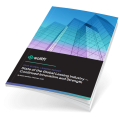Solifi has announced the release of its latest version of Solifi Asset-Based Lending (ABL) software, which includes several new and enhanced features designed to improve the lender and borrower experience through self-service functionality, gain insights into portfolio risk, and increase efficiencies through enhanced audit compliance and visibility. Solifi’s ongoing product development delivers innovation quickly through its software-as-a-service (SaaS)-based open finance platform, allowing customers to focus on building their business and onboarding new customers.
“Our newest ABL software release eliminates time-consuming low-value activities with more self-service functionality, a clear line of sight into portfolio risk in near real-time, and easier access to historical data for audit compliance,” says Bill Noel, chief product officer (CPO) of Solifi. “With our SaaS-based open finance platform, we release new features quarterly for our ABL lenders – allowing them to focus on portfolio growth without the distraction of on-premises upgrades.”
This latest quarterly release of Solifi’s ABL software brings significant new value to customers, including:
- More borrower control: Enhanced portal user profiles with 24/7 self-service functionality enables borrowers to grant permission levels to appropriate team members – empowering them to manage their accounts, while reducing administrative tasks by lenders, and ensuring better compliance and security.
- Improved risk management oversight: Near real-time aging comparison reporting functionality allows lenders to examine changes in their accounts receivable collateral more frequently than monthly – provides better oversight and opportunity to act immediately on under-performing accounts, and results in a closer representation of actual money borrowed and available collateral.
- Enhanced audit compliance and visibility: Archived data from historical tables and databases retrieval lets lenders retrieve cold-storage reports on terminated clients, enabling quicker responses and fewer internal resources needed to gather required audit information.









